Increasing your “ocean literacy”, speaking up for change and making smart choices – we can all strive for a healthy ocean.
The first World Oceans Day was proposed in 1987, to generate public interest in marine protection. The following 35 years have seen our oceans move from a state of urgency to a state of crisis.
Shocking images such as those of the baby albatross mistakenly fed coloured plastic by its parents have captured the world’s imagination and triggered its collective guilt. Yet plastic alone is not solely responsible for this state of crisis. In fact, there is a larger, more deadly and significantly better hidden threat. Overfishing is the largest, solvable, threat to face the ocean. Life on earth as we know it is under threat because of human misuse of the ocean which has added to the stresses of climate change, including a warming sea and ocean acidification.
Why should we care? Read our blog “What the ocean does for us” to better understand why now, more than ever, we need to urgently protect it.
Crucially – all is not lost.
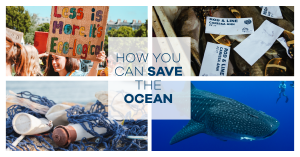
It is not possible to fix what we don’t know to be broken. But we do know about the plight of the sea and, better yet, we already know the answers of how to fix it. Blue Marine Foundation works tirelessly to address these enormous threats — and to drive strategic actions worldwide to reverse them. And we couldn’t do any of it without YOU!
There are many every day, simple decisions that we can all adopt to combat helplessness, from positive seafood choices to considered holiday excursions. Here are some of the ways YOU can get involved, to help save the ocean:
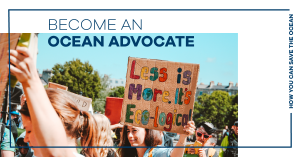
Become an ocean advocate
You may not realise it but your voice counts. If you use it, you can help achieve great things for our ocean. One of Blue Marine’s most successful campaigns was all thanks to support from the public. Understanding more about the ocean and using your voice for its protection is more powerful than you might think. In 2017 Blue Marine, along with partner members of the Great British Oceans coalition, launched the #BackTheBlueBelt campaign to protect 4 million square kilometres of ocean around the UK’s Overseas Territorites.
The height of that campaign saw the hashtag go viral, mentioned every 2.5 second on social media and an MP being Tweeted every 7.5 seconds. 285 MPs backed the campaign and signed the Blue Belt Charter, which has resulted in the formation of vast marine protected areas around Tristan da Cunha and Ascension Island, among others. Every effort to help is appreciated. And we make every effort to ensure every voice is heard by policy makers. See the journey of Ascension Island’s 100 per cent marine protected area here:
- Sign up to Blue Marine’s monthly newsletters on our home page to ensure you know what the next big campaign is and how to get involved.
- Being social matters! Follow Blue Marine on social media where all through June you can learn more about what the ocean does for us, the threats facing it, as well as our individual – and collective – roles in protecting it. But don’t stop there! There are lots of brilliant ocean charities, many of which we work collaboratively with to effect meaningful change. Just a few are Oceana, MCS, ZSL, Greenpeace, The Pew Trusts and RSPB.
- Be active in the solutions! Sign up for a local beach clean, volunteer your time or even donate your assets to relevant charities – all make a difference.
- Make the most of your time while you’re out for your evening run! Subscribe to Blue Marine Foundation podcasts to hear a very special upcoming edition on World Ocean Day featuring UN Patron of the Ocean, Lewis Pugh, in conversation with Charles Clover about Charles’s upcoming book, Rewilding the Sea (more on that later).
- Help us educate the next generation by getting schools to register and participate in ‘Our Blue’ – free online lessons for schools.
- Make sure your contribution is not just a drop in the ocean and join Friends of Blue Marine – a community of individuals and organisations playing an active role in protecting our seas for future generations. As a Friend of Blue Marine, you will have the chance to learn more about our work, volunteer, attend events and receive updates from ocean conservation initiatives all over the world.
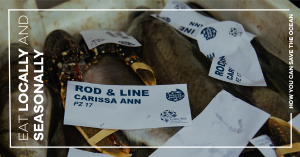
Eat locally and seasonally
Seafood is healthy, right? Well, yes, but rising population levels and increasing demand for seafood have led to overfishing becoming the biggest single threat to our ocean. Unsustainable fishing methods alongside growing demand means many fish stocks are rapidly decreasing.
How can you help?
The key is always choosing seafood that is sustainable, seasonal and local, whether cooking at home or eating out. Choosing local helps to keep food miles to a minimum, as approximately 80 per cent of British landed fish annually is exported and 80 per cent of British consumed fish is imported. The associated freezing and transport of fish creates unnecessary carbon emissions compared to choosing local options. Local fish is also fresher, normally taking one or two days to reach the fishmonger rather than frozen options that can be 14 days old by comparison.
Seasonality relates to targeting fish at the right point in the year, so fish stocks have a chance to breed and reproduce at more sustainable levels. Inevitably, if fishermen target a species all year round with no rest, the species eventually decline and sometimes beyond recovery. In the UK we love white fish, but this and other tastes have led to fishing fleets targeting certain species like cod and fishing them beyond sustainable levels in our waters. Your local fishmonger will be able to advise you on what species are local and in season. Try to avoid seafood that is caught by bottom trawling or dredging as these methods are damaging to marine habitat.
Speak up for the ocean. Next time you visit a restaurant ask if the fish on the menu is local, in season and sustainable. If Fish Friday sees you enjoying fish and chips why not try an alternative to overfished cod or haddock, such as hake, red gurnard or pollack.
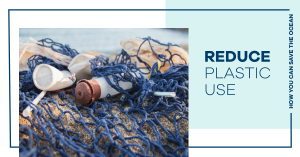
Reduce plastic use
Consumer waste is undoubtedly wrecking our oceans, but there is a little-mentioned aspect of plastic waste which is abandoned fishing gear. ‘Ghost gear’ makes up around 10 per cent of ocean plastic but kills four times as much marine life as the other 90 per cent, because it is designed for that purpose.
FADs (fishing aggregating devices) are floating rafts with long “tails” that drift through the ocean attracting tuna, but are often abandoned and get caught on coral reefs, damaging sensitive habitats and entangling marine life. Around the Aeolian Islands, north of Sicily, Blue Marine has found ghost nets that have caught hundreds of rare and beautiful fish and become weighed down with their dead bodies. They sink to the bottom, the fish rot and the net rises, only to begin the ghastly process once more.
There is, of course, work to be done in reducing our reliance on single-use plastics – and in removing this pollution from the ocean. Winners of the Science Ocean Award 2022, Madeline Evans and Prof. Christopher Ruf, have developed a new method for detecting ocean microplastic concentration using satellite imaging. From the heights of space to the depths of the ocean, new technologies are fast developing to help us get a grip on this mounting problem. Find out more about our Science Award winners by listening to the podcast:
Reducing your use of single-use plastics or joining a beach clean, are the first fantastic steps towards the transformation we need in our relationship with the resource on which we all depend.
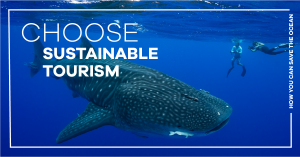
Choose sustainable tourism
When browsing holidays online, an ocean positive action you can take is to choose sustainable tourism operators wherever possible. Sustainable tourism covers many ideas from carbon saving hotel operating procedures, to product choices to lower human impact, sustainable food selections and even initiatives to restore and protect the environment. This may cost more but you are investing in the future health of our planet.
Sometimes it’s as simple as choosing the right dish when you are abroad. In Greece, Blue Marine has partnered with iSea to run a “Pick The Alien” campaign, promoting responsible seafood consumption by establishing edible marine alien species in consumer diets. About 1,000 alien species have entered the Mediterranean, some of which are invasive and compete with the native species for resources and habitats causing significant ecological damage. Responsible consumption of seafood through the replacement of native species – especially apex predators like groupers, greater amberjacks and swordfish – with edible alien species mitigates the pressure exerted on the marine ecosystems of the Mediterranean.
Habitat protection as part of tourism is also achievable. In the Maldives, Blue Marine partnered with Six Senses Laamu for a #ProtectMaldivesSeagrass campaign, calling on resorts to stop removing the seagrasses around their resort island to make clear lagoons for their guests. Within the space of three months more than a quarter of all resorts in the country committed to protecting more than 830,000m2 of seagrass.
It’s important, too, to “leave only footprints” – or in this case, bubbles! If you’re the adventurous type on holiday and enjoy swimming, snorkelling, jet skiing, paddleboarding or scuba diving, be mindful of local habitats. Marine life must never be touched – the majority of sea creatures are extremely fragile and many have thin skins, covered in a layer of mucus. This protects them from a loss of bodily fluid, and if this mucus is touched or removed, it can leave them vulnerable to skin disease. If you’re booking an excursion, choose tour operators that follow codes of conduct for responsible interactions with wildlife – often megafauna like dolphins and whales.
As international holidays boom again, another common issue that goes unnoticed is the damage to coral reefs from sun cream. National Geographic reports that 14,000 tonnes of sun cream are washed into the ocean each year. A good solution to this is opting for clothes with SPF in them and ensuring that any sun cream you buy uses eco-friendly compounds only. Such pollutants also affect the diverse habitats and reefs we have in the UK, so don’t forget pollution affects your rich seas too.
Read Rewilding the Sea
Understanding our oceans is the first step towards caring for them. World Ocean Day marks a particularly special celebration for Blue Marine this year. Charles Clover’s new book, Rewilding the Sea: How to Save Our Oceans is coming out on 8 June. Published by Ebury, the book provides tendrils of hope for the future of the ocean. A follow-up to The End of the Line, which was adapted into an acclaimed documentary and launched the Blue Marine Foundation, Rewilding the Sea explores how to let nature repair itself, through either protection or active restoration.
In Charles’s words, “This book tells the story of how I journeyed from despair to hope about the state of our common ocean. It’s a tale of beginnings, of extraordinary changes achieved around the world by small bands of dedicated people.”
Isabella Tree, author of Wilding, said, “This book is desperately needed. Interest in terrestrial rewilding is rocketing and now it is time for the sea. The material Charles Clover will be covering is rich, urgent and fascinating.”
You can pre-order Rewilding the Sea: How to Save Our Oceans from: smarturl.it/rewildingtheseabk
The oceans are what we all have in common, and we hope you join us in being hopeful this World Oceans Day – together we can make a difference.
Cover image: Credit Beth Taylor.


















